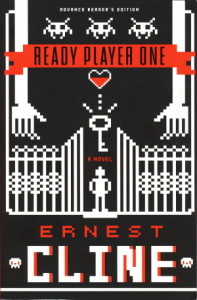College students have no time to read. That’s a broad generalization, but let’s face it, it’s kind of true. There’s no time to balance problem sets, exams, papers, 1000-page science textbooks, 10 classic English novels and a book for pure enjoyment.
So then how is it that we spend so much time online? Hours waste away with our eyes glued to Facebook, and Sporcle can drain away at least 60 minutes of good study time. We spend seemingly endless amounts of time surfing the Internet in search of anything to make us laugh, anything to waste just one more minute before going back to the real world of stress.
Well, what would happen if we disappeared into the online world altogether? What happens when the Internet becomes more than a tool and becomes life?
It’s the year 2044 in Ernest Cline’s new novel “Ready Player One.” It is the third decade of the ongoing economic recession, and the world outside is deteriorating before the eyes of humanity — that is if humanity were around to pay any attention.
Wade Watts, along with billions of other citizens of Earth, has taken shelter inside the OASIS. Created in 2012 by the Willy Wonka-esque James Halliday, the OASIS is an online interactive virtual reality that is more than a video game and more than the Internet. Over 30 years into its existence, OASIS has become a way of life.
Wade was born into a generation that lives inside the OASIS. As an orphaned 18-year-old living with his not-so-pleasant aunt and her even less pleasant boyfriend in a trailer park, it’s no wonder he chooses to hide in an alternate world. The virtual reality provides both his high school and his social life. In the evening, there is an entire universe to explore. It’s where Wade learns, grows and meets friends. Why venture outside something so infinite when reality is so limited?
Now here’s where things get interesting. Wade doesn’t spend his free time making new friends on other OASIS planets or exploring new worlds. He spends his time hunting. Hunting for what exactly? That’s where Halliday comes in.
No spoiler alert is necessary when I tell you that Halliday dies and his will is released for the entire OASIS to see. This is no ordinary will, though; in extraordinary fashion, Halliday leaves his $260 billion fortune and the leadership of the OASIS in the hands of any single person who can find the Easter egg he has hidden within his invention. Three clues are hidden to lead to the hiding place of the prize, and so the hunt begins.
Five years go by and not one person is closer to finding the mysterious Easter egg. It becomes a myth, a legend. Only a few of the most dedicated people continue searching.
Then, Wade finds the first key and the world turns upside down.
Cline sweeps up his audience in this sci-fi adventure of the past, present and future, binding nostalgia and futuristic technology together into a heroic journey. “Ready Player One” takes a very realistic “what if” question of our world and twists it into the ultimate geek voyage.
I’m not even this book’s ideal reader — that would be the video-game-obsessed, uber-geek child of the 80’s , and I only possess one and a half of those qualities. But what is fascinating and so entertaining about Cline’s novel is its uncanny ability to connect with the reader.
Sure, you may say you have no time to read, and that’s probably true. Instead of wasting hours in front of your computer, however, get lost inside the virtual world of Ernest Cline’s imagination. If there is one book you’re going to read during this crazy semester, or even this year, make it “Ready Player One.”
Rosenberg is a member of the class of 2012.






